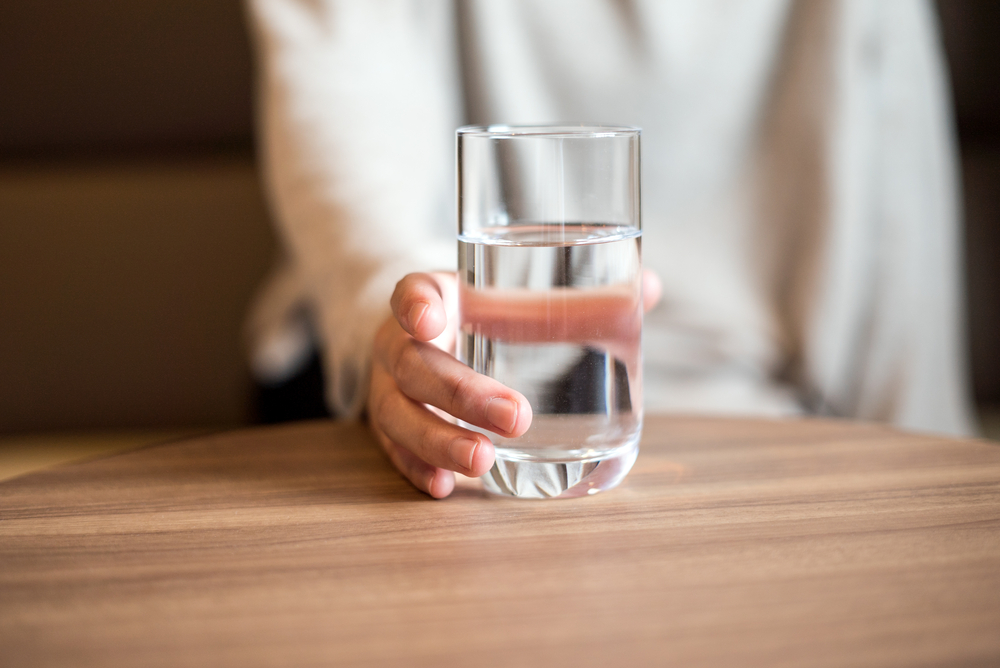You’re sitting at your desk and suddenly it hits you: Your head is throbbing, you’re feeling a little shaky, and your mouth… well, it’s pretty dry. “I should probably get a drink of water,” you think to yourself. But according to science, when the physical symptoms hit, you’re already dehydrated.
If your typical workday is jam-packed, or you’re simply away from a water source for hours on end, making sure you’re hydrated can be tough. And the consequences of being dehydrated can have an impact inside and outside the office. “People who are dehydrated feel more tired: If you are dehydrated in the late afternoon, you may decide to skip the gym after work. If you do go, you are likely to do less and enjoy it less,” Ron Maughan, Ph.D., a professor of medical and biological sciences at the University of St. Andrews, tells Thrive. “We know, too, that mental performance and concentration are impaired by dehydration.”
If the grogginess and lack of motivation aren’t enough to convince you to start sipping throughout the day, get this: Dehydration can impair cognitive flexibility and precision, which can have a very real impact at work. Hopefully you’re reaching for your water bottle right about now, but if you’re still wondering how to tell if you’re drinking enough water, or better yet, how to make hydration a habit, these tips will help.
Broaden your diet
Surprise — there are other ways to increase your water intake besides drinking it. In fact, Melinda Millard-Stafford, Ph.D., a professor of biological sciences and exercise physiology at Georgia Tech, says water alone is not the best hydrating fluid. “Consider consuming salty snacks with water, or a beverage with some salt, like sport drinks with electrolytes. Even milk is a better hydrator than plain water,” she tells Thrive. And while you’re at it, make foods with a high water content part of your everyday diet. According to the Mayo Clinic, many fruits and vegetables are almost 100 percent water by weight, like watermelon and spinach, and can help keep you hydrated throughout the day. Adding these H2O-heavy foods to your diet can especially help if water simply doesn’t taste good to you. You can also try eating more salads (don’t forget the spinach), adding fruit to your water, or drinking tea.
Look for this unexpected dehydration cue
While feeling thirsty should cause some dehydration alarm bells to go off in your head, so should the color and frequency of your urine. “If you have not passed urine for some time, and the volume is small and dark-colored, you have not been drinking enough,” Maughan says. If you’re adequately hydrated, your urine should be a yellow, pale straw color, Millard-Stafford adds.
Practice hydration check-ins
Developing greater awareness of your personal signs of dehydration can help you build a habit of making water part of your everyday routine. Things to look out for? A general feeling of tiredness, a hard time completing tasks that require complex processing or your full attention, and difficulty regulating your mood. It’s also important to remember that your signs of dehydration very likely look different than someone else’s. “Every individual is different with their water needs, especially if sweat losses occur during the day,” Millard-Stafford says. Your activity levels can also play a role in how much water you need to drink to stay hydrated.
A great way to get more attuned to your hydration needs is by checking in with yourself, and tagging that check-in onto a habit you already do daily, like eating lunch or brushing your teeth. When you’re doing that, think back to the last time you had a cup of water, contemplate how you’re feeling (Moody? Can’t concentrate?), and simply whether or not you feel thirsty. “It is important to drink enough, but not too much,” Maughan says. “More is not always better, and too much is as harmful as too little, so listen to your body.”
Follow us here and subscribe here for all the latest news on how you can keep Thriving.
Stay up to date or catch-up on all our podcasts with Arianna Huffington here.


